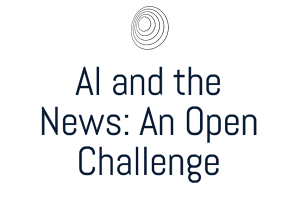Hussman School team a semi-finalist in international 'AI and the News' challenge

A project team from the UNC Hussman School of Journalism and Media has been named a semi-finalist in "AI and the News: An Open Challenge" — a call for innovative solutions to reshape the landscape of news with the help of artificial intelligence (AI).
The team pitched "Story Prospector" — a tool for journalists to quickly run multiple AI algorithms and statistical models on structured and unstructured data in order to extract insights that are visualized and presented in natural language. Team members from the Hussman School include Assistant Professor Steven King and Assistant Professor Amanda Reid.
"We think it's vital that journalists have access to artificial intelligence tools to help them find new ideas and new stories," said King. "At the same time, it's also important that journalists understand how AI works — specifically machine learning — because it's not a magical black box. It's a tool that, if we as journalists gain understanding from it, we can get great value."
The Ethics and Governance of Artificial Intelligence Initiative — in coordination with the MIT Media Lab and the Berkman Klein Center for Internet & Society at Harvard University — called for ideas to solve problems falling into four categories:
- Governing the Platforms: to increase the transparency and accountability of AI on information systems
- Stopping Bad Actors: to detect and tackle issues of disinformation existing in the news industry
- Empowering Journalism: to help journalists better communicate AI and its impact on the public
- Reimagining AI and News: to redesign digital platforms so they can better serve society at large
The Ethics and Governance of Artificial Intelligence Initiative — supported by the John S. and James L. Knight Foundation, Omidyar Network, LinkedIn co-founder Reid Hoffman and the William and Flora Hewlett Foundation — is a hybrid research effort and philanthropic fund focused on the ethical development of automation and machine learning.
There were more than 500 applicants from around the world, but the Hussman School team is among the 66 semi-finalists who will continue to compete for a portion of the $750,000 total prize. Applicants consist of various organizations and institutions, including universities, newsrooms, policy centers and the like.
Before the final phase of the challenge, semi-finalists are asked to provide a detailed budget outlining the anticipated expenses of the project. The projects will then be evaluated against six major criteria: relevance; impact; capacity; scalability; innovation; and technical feasibility.
Although the remaining project proposals have an array of focuses, all show a desire to implement solutions with a community-focused and culturally cognizant context. A second project from UNC-Chapel Hill — called "Ethical Disinformation Detection via Fact Verification and Logical Entailment Models" — proposes to ethically detect and prevent the spread of disinformation within online social and news channels via explainable/interpretable end-to-end neural networks.
The Ethics and Governance of Artificial Intelligence Initiative will announce the challenge winners in March 2019.